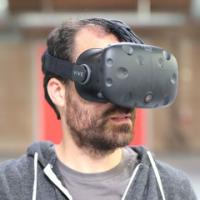When their autistic son fell in love with a virtual reality headset, Vibha and Vijay Ravindran got an idea: could this unlimited digital world help people who have trouble engaging in the physical world? Together, they founded a company called Floreo to develop VR programs for people with developmental disabilities, helping them break free from the constraints of their bodies and the typical pressures of their learning environment.
Like many people with autism spectrum disorder (ASD), the Ravindrans’ son has trouble with joint attention—sharing attention with another person on a common object. For most of us, this is so natural that we don’t even notice we’re doing it, but it’s a crucial skill for social interaction and learning. Their VR program is designed to help teachers build joint attention with their students by reinforcing and rewarding focus on certain objects or activities.
The ability to literally see exactly what the student is seeing on an iPad helps educators work with autistic students who have even very limited verbal skills. Eventually, they want to develop even more realistic simulations (like interacting with police officers on the street) that can help kids build the skills they need out in the real world — in a safe, low pressure environment, where they are in control.
Today, their software is being tested in special needs classrooms, and teachers have been amazed by the results. In a pilot study, 10 out of 12 kids with moderate to severe ASD showed clear, measurable improvement in joint attention. They are now partnering with hospitals, schools, and the National Institutes of Health to work on more advanced projects, but the ultimate goal, Vijay says, will always be creating stronger, more rewarding relationships for autistic kids and their family.

